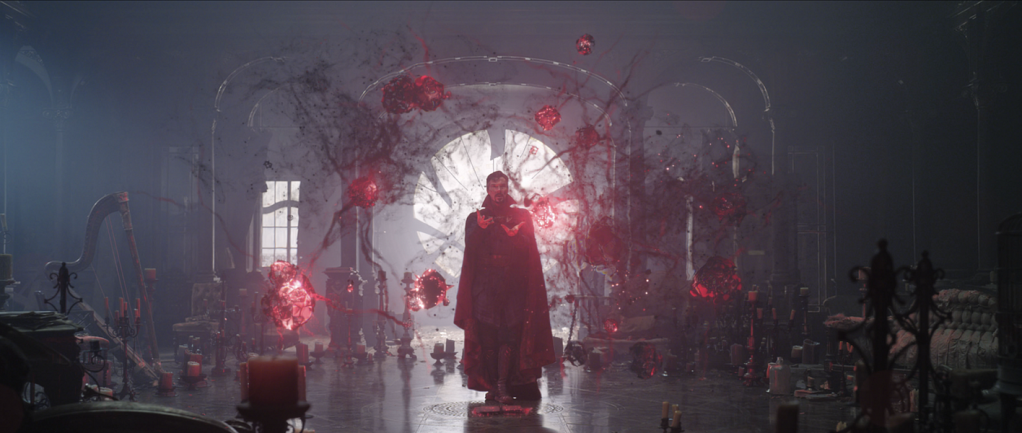Dr. Strange in the Multiverse of Madness promises audiences a trippy, horror-inspired spectacle, with Benedict Cumberbatch at the center as the titular sorcerer. It delivers Benedict Cumberbatch as the titular sorcerer. Rather than trippy or dark or interesting, everything else around him that we were promised seems … boring? Unoriginal? Cliché?
Cumberbatch capes up once again as Dr. Strange, the magical Avenger and most powerful sorcerer in the world, in his second solo outing. The object, once more: saving this universe. Or this time, saving all of the universes, Marvel’s new M.O. as it seeks to differentiate itself from its previous “phases”—as it so self-aggrandizingly calls its movie arcs—where only one universe was constantly under threat. Strange meets America Chavez (Xochitl Gomez), a universe-jumping superhero who is unable to control her power to traverse the multiverse and who is being chased by demons who seek to sap her of her power, a process that would kill her. Strange learns the demons are under the control of another magical being, and works to protect Chavez. Universe hopping and hijinks ensue.
The movie suffers somewhat from being released so shortly after Everything, Everywhere All at Once, a multiverse film that is truly brilliant and creative. As a result, the parts of Dr. Strange in the Multiverse of Madness that are supposed to be fun and mind-blowing come off derivative. Dr. Strange travels through a universe where he’s a streak of paint? Pretty similar to Evelyn Wong going to a universe where she’s a rock in Everything, Everywhere All at Once. Dr. Strange goes to a universe where everyone is made of cubes? Evelyn Wong went to a universe where everyone had hot dog fingers (it’s exactly what it sounds like). Everything, Everywhere All at Once leaned into the idea that the multiverse contains universes where everything and anything are possible, showcasing a variety of weird and wacky divergent timelines. Dr. Strange in the Multiverse of Madness shows, like, four, and then calls it a day. After a brief scene in which Strange and Chavez travel through a few weird universes, every one they visit thereafter is fairly conventional. Every universe has human life that looks exactly like ours in cities that resemble (or used to) our ideas of what cities are or could be. Every universe even has a Dr. Strange! And every Dr. Strange happens to look like Benedict Cumberbatch.
That the main conceit of having a multiverse movie is played off so underwhelmingly would be issue enough for the film, but it suffers from superhero films’ typical ailments as well. Weightless CGI monster fights. A third act moment where a superhero who doesn’t understand her powers can suddenly control them when they’re needed most by trusting herself. A huge threat that’s handled by only one hero even though there’s an established team of heroes that exists precisely for occasions like this.
All of this adds up to a silly mess of a movie that is remarkably similar to every other Marvel movie with the exception of the occasional idiosyncratic flourish from director Sam Raimi—the best being when Christine Palmer (Rachel McAdams) starts blasting demons with a magic firearm and cheesily says “Go back to hell!” That scene feels so unlike anything Marvel that it’s a pleasant reprieve from the slog of house-style direction that comprises the rest of the movie. The most amusing part of the movie, however, isn’t even anything written in the script—it’s the obvious cutlines around scenes involving gay characters that would have been removed in the Chinese version of the film if Disney had gotten its way and had the movie released in the country. Chavez was raised by a lesbian couple, whom she accidentally killed because she couldn’t control her powers. Strange refers to her “mothers” once, and then in his big, inspiring monologue to her at the end he is very careful to refer only to her “parents.”
Disney was all ready to boycott Georgia in 2016 when the state nearly passed a law that would have allowed faith-based organizations to deny services and jobs to the LGBTQ community. A pity for Georgia that it doesn’t do more business for Disney, which shows over and over that its moral outrage doesn’t keep it from being willing to work with a country that puts people in concentration camps and commits genocide as long as the price is right.
(Disney says the relative financial success of Dr. Strange in the Multiverse of Madness proves it doesn’t need China, sounding an awful lot like the bitter ex who is doing just fine without his former flame and then drunk texts her at 2 a.m..)
As I left Dr. Strange in the Multiverse of Madness, what I felt the most was, fittingly, mad. I got suckered in once again by a Marvel property that promised to be something different, that even hired a big name director with a unique style and vision. But what I got was more of the same. Maybe the title is more meta than we realized.







Please note that we at The Dispatch hold ourselves, our work, and our commenters to a higher standard than other places on the internet. We welcome comments that foster genuine debate or discussion—including comments critical of us or our work—but responses that include ad hominem attacks on fellow Dispatch members or are intended to stoke fear and anger may be moderated.
With your membership, you only have the ability to comment on The Morning Dispatch articles. Consider upgrading to join the conversation everywhere.